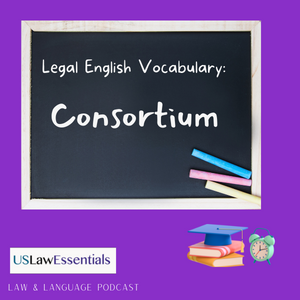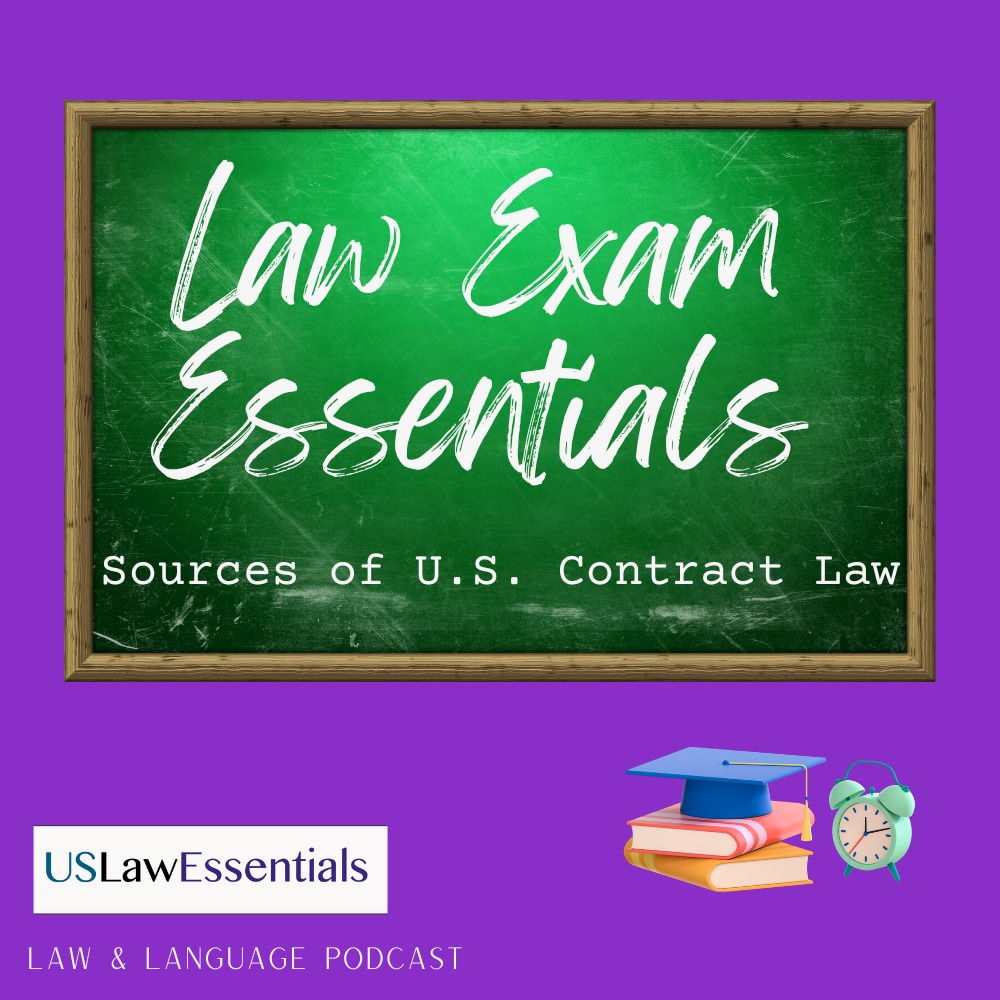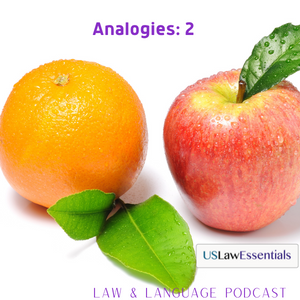Episode Transcript
Speaker 0 00:00:00 Welcome to the U S law essentials law and language podcast, the legal English podcast for non-native English speakers that helps you improve your English, listening, improve your legal English vocabulary and build your knowledge of American
Speaker 1 00:00:15 Legal, all the honorable. Hey, I'm Daniel Edelson and I'm Steven Horowitz.
Speaker 0 00:00:27 And Steven, I heard that there's something on your mind and you want to talk I'm here for you. Yeah,
Speaker 2 00:00:34 Thanks, dude. I'm really glad you're here because I have been asked to teach a course called introduction to U S law and lawyers to a group of, uh, international students or law students. Um, and it's, it's a one-week course. It's sort of the intensive part of a longer course. Um, and I think you've taught this before and developed a whole sort of curriculum around this and I wanted to pick your brain about it. And, um, and I thought, well, why not just record this because it'll, I think it'll be, can be helpful for listeners and also for students and future students of this course to sort of hear our thinking on the course as we sort of talk through it.
Speaker 0 00:01:22 Well, that sounds great. And I'm glad you, I'm glad you asked me about this.
Speaker 2 00:01:27 Oh, so I really wanted to talk to you about this.
Speaker 0 00:01:31 I'll try not to ruin your course too. Okay.
Speaker 2 00:01:35 So anyway, um, so what, well, I guess I gotta start at the beginning. Like how, how do you start this course?
Speaker 0 00:01:44 Well, at the very beginning, I let people know that really the goal that I have in the course is to make people feel more confident and comfortable in a us law classroom. And that's really the overarching goal of the entire course.
Speaker 2 00:02:11 So Dan, how, how do you do that?
Speaker 0 00:02:14 Well, the very first thing I do is I give them a final exam.
Speaker 2 00:02:19 Wait, wait, wait, wait, you give them a, on the first day you give them a final exam and you're say, you're trying to make them feel comfortable and confident.
Speaker 0 00:02:26 Yeah. I didn't say I was good at making them feel comfortable and confident, but yeah, that's what I do. Um, well, yeah, so it's not the very first thing I do, but I already know that you are a warm, supportive guy and that they'll feel happy and confident as soon as you walk in the classroom. But one of the first things that I do in this class is I hand out what I put in quotes as the final exam. And essentially this is an overview with some questions of what they're going to be learning in the first week. And it's basically just five questions. Ah,
Speaker 2 00:03:07 So saying it's a final exam really just kind of gets their attention. It gets their focus.
Speaker 0 00:03:12 Exactly. Exactly. Well,
Speaker 2 00:03:14 Well, I'm going to, okay, so I'm going to steal that.
Speaker 0 00:03:17 Yeah. Yeah. So you'll, you'll see, you'll see, people are starting, you know, might not be paying that much attention. They figure it's just an introduction. And then you say, okay, it's time for your final exam. And that that'll get people's attention.
Speaker 2 00:03:29 That would get my attention. Definitely.
Speaker 0 00:03:32 Yeah. I've had dreams. I still get them where I walk into a classroom, the professors handing out a test and it's my first day attending the class. So it's this, this rings true to me.
Speaker 2 00:03:46 Me too. I, I, I periodically have dreams where I have not been able to do any of the work during the semester and I'm kind of racing to get to class and I get there and I haven't done any of the work.
Speaker 0 00:04:00 Yeah, I, okay. So I'm glad I'm not just you. Okay. All right. So what I do is, um, I hand a handout this, um, the sheet of paper with these questions on it and the questions are what is a federalism? Okay. What are checks and balances? What is separation of powers? What is the supremacy clause and what is the bill of rights?
Speaker 2 00:04:32 Okay. Five questions, right. I got to answer them right now.
Speaker 0 00:04:36 Um, if you want to, um, cause most of the students do and they can usually get either all five or four out of five. They can usually do a pretty good job. So w we can start with the first one, say, what is federalism?
Speaker 2 00:04:49 Uh, federalism is a system. Good
Speaker 0 00:04:57 Government. Yeah. It is a system of government. That's great. You're doing wonderful. Um, and next question. Ah, well, that's the thing, it's not a graded final exam, so you can move on to the next question. You know, what is separation of powers, but what else do you know about federalism
Speaker 2 00:05:13 Federalism? Let's see, I think it has something to do with like a central government and, uh, and local government. So national government and state governments. Great. I don't think that, I know it I'm, I'm sort of,
Speaker 0 00:05:27 Yeah, of course. You know? Right. And, and that's the thing, a lot of the, a lot of the students who take this class have learned what federalism is and they might even come from a country that has a system of federalism, although it might not be exactly like the U S system of federalism. Yeah.
Speaker 2 00:05:49 A lot of the, uh, Latin American countries, Mexico and south America and central America have federal system
Speaker 0 00:05:55 Germany. It's, it's not federalism itself is not unique to the United States. And a number of people either have come from a country that has federalism, or they're at least familiar, familiar with federalism and they'll provide some sort of definition just like you in terms of, okay, so power is distributed to a national government and it's also distributed to state governments or provincial governments, whatever the term of the student wants to use. And, but what I think happens for a lot of these questions is students can come up with a definition, but they might not be comfortable explaining what they mean. And they also might not necessarily understand how federalism checks and balances separation of powers actually works in the United States. And they might not have concrete examples of how all of these different concepts actually are interconnected.
Speaker 2 00:07:07 Yeah. So all the implications of it, all the, I mean, it's almost the culture, the American legal culture is, is sort of where it starts to, to, to manifest itself.
Speaker 0 00:07:19 Right. Right. So almost every student knows what separation of powers are. I mean, that's, that's something that's really common to a number of different countries, but
Speaker 2 00:07:32 An executive branch, a legislative branch, judicial branch, maybe another branch.
Speaker 0 00:07:39 Absolutely. Although of course, some students might even have difficulty pronouncing these different branches. But I think as students start to try to express this, they realize that they might not know in detail exactly how power is separated in the, in the U S federal government. And also exactly how the different branches are able to check the power of the other branches. And they might not necessarily be comfortable with recent news events or recent cases that illustrate how this is practiced in the United States.
Speaker 2 00:08:21 So essentially if you're a lawyer and a client, you have a client and you need to navigate the legal system, understanding where those lines and those, those, um, those dividers are and how to navigate the system, whether it's state or federal or interactions between the two.
Speaker 0 00:08:40 So even for example, like the hardest question, which might be, what is the supremacy clause, students might not necessarily know exactly what that is. And by the way, Steve, do you know what the supremacy clause,
Speaker 2 00:08:53 I'm pretty sure I do. It's the, it says that the constitution is the highest law of the land. And if there's any conflict between, uh, state laws and laws created, uh, by the federal government, the laws from the federal government, uh, generally supersede those of, of the state law.
Speaker 0 00:09:14 Yeah. I think that's, I think that's accurate. And many students, even if they don't know the term, the supremacy clause, they're generally familiar with this, with this idea, but they might not necessarily know exactly how courts determine whether or not there is such a conflict that would require the federal law to preempt a state law. And what, what I find useful in this type of final exam is it introduced the, it introduces these ideas. It gets students to talk about it, but then it also introduces what you'll be doing in this intensive first week, which is actually showing how this is practice and how these different concepts shouldn't be viewed in isolation, but you can actually start establishing the relationships between that's the fun part. That is the fun part, because you can start bringing, bringing in all sorts of different material. And I'm happy to talk about those ideas with you as a way to give students an opportunity to start really living and breathing these days. So what's,
Speaker 2 00:10:31 What's an example that you might use or concrete example.
Speaker 0 00:10:37 Well, my favorite example, which I've been using for the past few years is a proposed law from a few years ago called the states act. Have you heard of it? Yeah, exactly. Sounds like it's about states, right? It's
Speaker 2 00:10:56 All, it's all capital letters. It's like capital.
Speaker 0 00:11:03 It stands for, do you know what it stands for?
Speaker 2 00:11:06 Wait, what is it that something 10th amendments amendment through, uh, warring states
Speaker 0 00:11:22 Empowering. Okay. I, it's a great, it's a great example. Cause, cause to understand it, you need to understand, um, federalism and it refers to the 10th amendment, which is actually the amendment most closely associated with federalism, but it also brings up the idea of federal law of state law and how power is distributed, not just to the federal government, but also to the state governments. And it it's a, it's an interesting, it's an interesting topic. I will absolutely share the material that I use because it really will require the students to understand all of these different concepts,
Speaker 2 00:12:18 But it's really just a, a marijuana law. It w it was,
Speaker 0 00:12:22 Yeah, it was a proposed marijuana law, but all it really does is say those people that, that, that people who are complying with state law with respect to marijuana cannot be prosecuted under federal law.
Speaker 2 00:12:42 Well, I think it's so great that they named it, the states act because then it doesn't sound so insidious. It doesn't sound drug oriented. I thought whoever came up with that was must've been, uh, uh, a very creative communications type of person. Well, that's one of
Speaker 0 00:13:01 The questions that I asked the students, like, why do you think it's called the states act as opposed to, you know, um, let states legalize marijuana if they want to act. And it gives students an opportunity to start thinking about how politicians in the U S will name and promote legislation that they want people to support.
Speaker 2 00:13:30 Oh, you mean like no child left behind things that you just gotta love. Right. They just sound good. So, so Dan is, as you're talking about the states act, I can, I can see now how it's, it's really, it goes beyond just definitions of federalism, separation of powers, checks, and balances, and really applies the knowledge and, and sort of require students to, to be able to talk about it, to be able to express the ideas in different ways. Um, and in ways that take into account the federal system that we have in the U S as you know, as part of the U S legal system. Um,
Speaker 0 00:14:14 Yeah, and I think that's consistent with what happens in a U S law school where rarely, it rarely you're being taught to simply provide, wrote definitions. Instead, you're going to be asked to be able to apply different principles in different circumstances. So here are the states act and the legalization of marijuana brings up all sorts of issues where federal law and state law might intersect. And this just comes up all the time. So for example, what happens when certain states want to allow people of the same gender to marry, but other states don't and how does that relate to the bill of rights, to fundamental rights under the constitution and to the judicial branch of government? So it's a great opportunity for students to practice talking about these principles and explaining how these principles are applied under real world circumstances.
Speaker 2 00:15:29 Yeah. And it, and it's not static as you're talking about same-sex marriage. I mean, that's an issue that's now been resolved by the Supreme court, um, and settled that it's the same rule for all 50 states, but there's other, there's other issues that are brewing and that are future controversies, like, like
Speaker 0 00:15:47 Gun laws. So that, that, that's a great, that's a great example too. So I think, I think you're going to teach a great class if you like, maybe what we can do for our, our next podcast is we could talk a little bit about the, the states act.
Speaker 2 00:16:03 Oh yeah. That would be really great. That'd be really helpful. Thanks, Dan.
Speaker 0 00:16:07 And thank you very much for listening to the U S law Central's law and language podcast. Remember if there are other topics that interest, you just let us know and stay tuned to hear more about how Steve and I teach us law and legal English.


